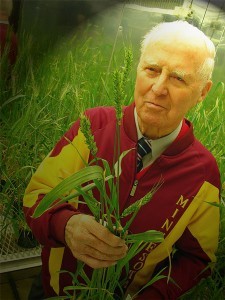
Development Entrepreneur: de·vel·op·ment – en·tre·pre·neur
–noun
- A highly proficient development professional who successfully transforms need into opportunity in order to (a): solve problems for the world’s most vulnerable people, and (b) bridge the gap between the inconceivable and the achievable so they can do the most good for the most people at their greatest time of need.
- Development professionals at their best- maximizing resources, taking calculated risks and learning as much from past failures as successes; often with the following characteristics: innovative, resourceful, risk-takers for good, ingenious, driven, rebels with a cause, enterprising.
Profile of a Development Entrepreneur:
Norman Borlaug, Father of the Green Revolution
While working in Mexico as a crop researcher, Norman Borlaug had a notion that the long-held belief that wheat seeds needed to rest prior to harvest was a myth. His vision was that if he could harvest his disease-resistant strain of wheat in one part of the country, he could immediately take the seeds to higher elevations and get a second growing season.
His supervisors doubted him, and he came close to losing all of his seeds trying to cross a river- which nearly cost him his job. But ultimately his discoveries became a breakthrough in agricultural technology known as the Green Revolution, resulting in the most the dramatic increase in crop production in the history of mankind and helping to feed a billion people worldwide.
Norman Borlaug was a transformational development entrepreneur. And he is an inspiration to all who are willing to take calculated risks to find the innovative solutions that improve lives and ultimately create the conditions where development assistance is no longer necessary.
Dr. Shah Shares the Experience that Inspired the Term “Development Entrepreneur”
“Water was one of the most pressing concerns following the earthquake in Haiti. With the country’s water network badly damaged, USAID mobilized water providers and trucking companies to establish a new network that would also provide purification tablets with water deliveries to distribution sites across the country- a novel approach borne out of research that showed people are more likely to use chlorine tablets if they are handed out with water.
As a result of the delivery truck system, Haitians had access to 50 percent more drinking water after the earthquake than before, and diarrheal illness dropped by 12 percent compared to pre-earthquake levels thanks to the adoption of the chlorine tablets.
This small success demonstrates USAID at our best. We turned a need into an opportunity. We applied the latest learning in behavioral economics to the most pressing problem, found the resources we needed to get the job done, and worked around any red tape that stood in the way. We acted like entrepreneurs—and that’s the ‘light bulb moment’ that inspired the term “development entrepreneur.”







Comment
Make a general inquiry or suggest an improvement.